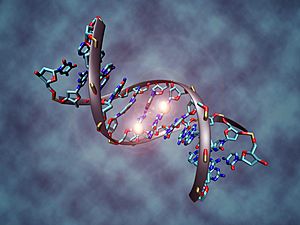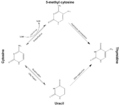DNA methylation facts for kids

DNA methylation is a super important process that helps control how our genes work. Think of it like a dimmer switch for genes. It can turn them on or off, or make them work more or less. This is especially important when we are growing and developing.
So, how does it work? Tiny chemical tags called methyl groups are added to our DNA. When these methyl groups attach to a gene, they often make it harder for that gene to be "read" or used by the cell. This process is called gene transcription.
Our DNA is made of four building blocks called nucleotides: A, T, C, and G. In humans and animals, methyl groups usually attach to the 'C' nucleotide, which is cytosine. This helps control which genes are active in different parts of our bodies.
What is Epigenetics?
DNA methylation is a big part of something called epigenetics. Epigenetics is the study of changes in how genes work, but these changes are not caused by changes in the actual DNA code itself. Imagine your DNA is like a recipe book. Epigenetic changes are like sticky notes or highlights that tell the cell which recipes to use and which ones to ignore, without changing the words in the recipes.
These changes can affect how genes express themselves, meaning how they show up as traits or functions in an organism.
How Long Do These Changes Last?
The changes made by DNA methylation can last for a long time. They can stay with a cell for its whole life. When cells divide to make new cells, these methylation patterns can even be passed down to the new cells. This means that a cell's "memory" of which genes to turn on or off can be kept through many cell divisions.
However, it's important to remember that DNA methylation does not change the basic DNA sequence. Your genetic code stays the same. Instead, other factors cause your genes to behave differently.
Images for kids
See also
 In Spanish: Metilación del ADN para niños
In Spanish: Metilación del ADN para niños
 | Ernest Everett Just |
 | Mary Jackson |
 | Emmett Chappelle |
 | Marie Maynard Daly |



